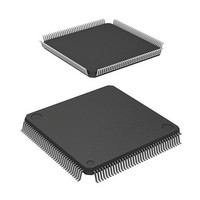R5F61665N50FPV Renesas Electronics America, R5F61665N50FPV Datasheet - Page 586

R5F61665N50FPV
Manufacturer Part Number
R5F61665N50FPV
Description
MCU FLASH 512K ROM 144-LQFP
Manufacturer
Renesas Electronics America
Series
H8® H8SX/1600r
Datasheet
1.R5F61665N50FPV.pdf
(1492 pages)
Specifications of R5F61665N50FPV
Core Processor
H8SX
Core Size
16/32-Bit
Speed
50MHz
Connectivity
EBI/EMI, I²C, IrDA, SCI, SmartCard, USB
Peripherals
DMA, LVD, POR, PWM, WDT
Number Of I /o
92
Program Memory Size
512KB (512K x 8)
Program Memory Type
FLASH
Ram Size
40K x 8
Voltage - Supply (vcc/vdd)
3 V ~ 3.6 V
Data Converters
A/D 8x10b; D/A 2x8b
Oscillator Type
External
Operating Temperature
-20°C ~ 75°C
Package / Case
144-LQFP
Lead Free Status / RoHS Status
Lead free / RoHS Compliant
Eeprom Size
-
Available stocks
Company
Part Number
Manufacturer
Quantity
Price
Company:
Part Number:
R5F61665N50FPV
Manufacturer:
Renesas Electronics America
Quantity:
10 000
- Current page: 586 of 1492
- Download datasheet (8Mb)
Section 11 EXDMA Controller (EXDMAC)
11.10
1. EXDMAC Register Access during Operation
2. Module Stop State
• ETENDE = 1 in EDMDR (ETEND pin enable)
• EDRAKE = 1 in EDMDR (EDRAK pin enable)
• EDACKE = 1 in EDMDR (EDACK pin enable)
3. EDREQ Pin Falling Edge Activation
Rev. 2.00 Oct. 21, 2009 Page 552 of 1454
REJ09B0498-0200
Except for clearing the DTE bit to 0 in EDMDR, settings should not be changed for a channel
in operation (including the transfer standby state). Transfer must be disabled before changing a
setting for an operational channel.
The EXDMAC operation can be enabled or disabled by the module stop control register. The
initial value is "enabled".
When the MSTPA14 bit is set to 1 in MSTPCRA, the EXDMAC clock stops and the
EXDMAC enters the module stop state. However, 1 cannot be written to the MSTPA14 bit
when any of the EXDMAC's channels is enabled for transfer, or when an interrupt is being
requested. Before setting the MSTPA14 bit, first clear the DTE bit in EDMDR to 0, then clear
the DTIF or DTIE bit in EDMDR to 0.
When the EXDMAC clock stops, EXDMAC registers can no longer be accessed. The
following EXDMAC register settings remain valid in the module stop state, and so should be
disabled, if necessary, before making the module stop transition.
Falling edge sensing on the EDREQ pin is performed in synchronization with EXDMAC
internal operations, as indicated below.
1. Activation request standby state: Waits for low level sensing on EDREQ pin, then goes to
2. Transfer standby state: Waits for EXDMAC data transfer to become possible, then goes to
3. Activation request disabled state: Waits for high level sensing on EDREQ pin, then goes to
After EXDMAC transfer is enabled, the EXDMAC goes to state [1], so low level sensing is
used for the initial activation after transfer is enabled.
[2].
[3].
[1].
Usage Notes
Related parts for R5F61665N50FPV
Image
Part Number
Description
Manufacturer
Datasheet
Request
R

Part Number:
Description:
KIT STARTER FOR M16C/29
Manufacturer:
Renesas Electronics America
Datasheet:

Part Number:
Description:
KIT STARTER FOR R8C/2D
Manufacturer:
Renesas Electronics America
Datasheet:

Part Number:
Description:
R0K33062P STARTER KIT
Manufacturer:
Renesas Electronics America
Datasheet:

Part Number:
Description:
KIT STARTER FOR R8C/23 E8A
Manufacturer:
Renesas Electronics America
Datasheet:

Part Number:
Description:
KIT STARTER FOR R8C/25
Manufacturer:
Renesas Electronics America
Datasheet:

Part Number:
Description:
KIT STARTER H8S2456 SHARPE DSPLY
Manufacturer:
Renesas Electronics America
Datasheet:

Part Number:
Description:
KIT STARTER FOR R8C38C
Manufacturer:
Renesas Electronics America
Datasheet:

Part Number:
Description:
KIT STARTER FOR R8C35C
Manufacturer:
Renesas Electronics America
Datasheet:

Part Number:
Description:
KIT STARTER FOR R8CL3AC+LCD APPS
Manufacturer:
Renesas Electronics America
Datasheet:

Part Number:
Description:
KIT STARTER FOR RX610
Manufacturer:
Renesas Electronics America
Datasheet:

Part Number:
Description:
KIT STARTER FOR R32C/118
Manufacturer:
Renesas Electronics America
Datasheet:

Part Number:
Description:
KIT DEV RSK-R8C/26-29
Manufacturer:
Renesas Electronics America
Datasheet:

Part Number:
Description:
KIT STARTER FOR SH7124
Manufacturer:
Renesas Electronics America
Datasheet:

Part Number:
Description:
KIT STARTER FOR H8SX/1622
Manufacturer:
Renesas Electronics America
Datasheet:

Part Number:
Description:
KIT DEV FOR SH7203
Manufacturer:
Renesas Electronics America
Datasheet:











